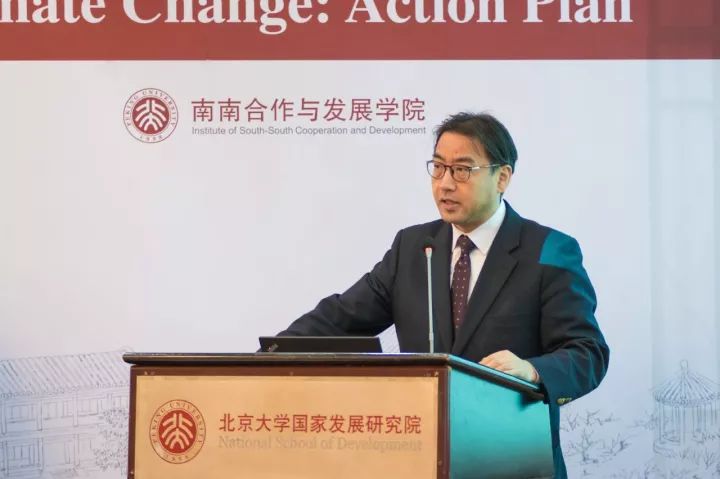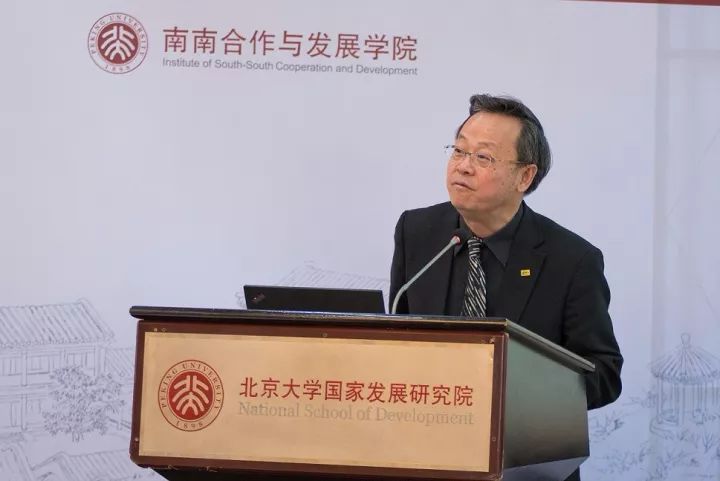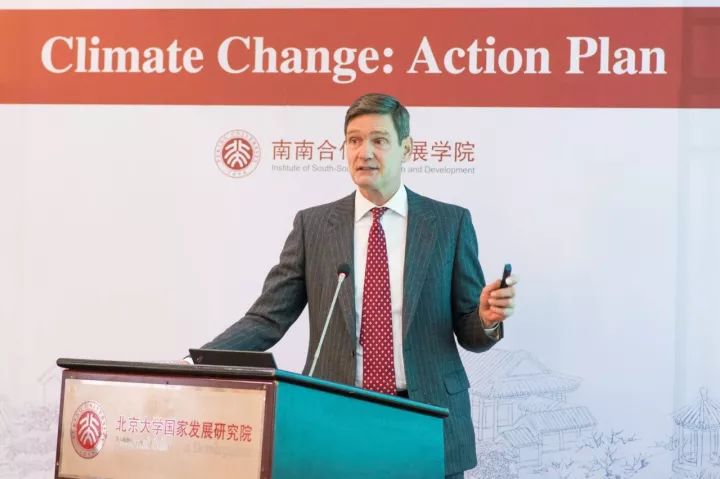
Climate Change and South-South Cooperation:
ISSCAD is working on sharing Chinese wisdom and experience, building an international platform to exchange knowledge and ideas with developing countries, and creating opportunities for joint efforts on fulfilling mankind’s goal of sustainable development.
High-level Workshop on Policy Approach of Bamboo and Rattan in Sustainable Development and South-South Cooperation was held in Beijing, sponsored by the Ministry of Commerce of the People's Republic of China (MOFCOM), co-organized by Institute of South-South Cooperation and Development (ISSCAD), and International Network for Bamboo and Rattan (INBAR). A forum was organized by the Institute at Langrun Garden, Peking University on November 13th, with a theme of ‘Climate Change: Action Plan’, conducted by Prof. Fu Jun, Academic Dean of the Institute of South-South Cooperation and Development. Students of the Institute of South-South Cooperation and Development, as well as ministers, ambassadors, and envoys from more than 30 developing countries, attended the forum and participated in the panel discussions.
The Forum was divided into three parts, including the opening remarks made by Prof.Fu Jun and Dr. Li Zhiyong, Deputy Director General of INBAR, keynote speeches brought by three scholars and a panel session facilitated by Prof. Fu Jun.

Prof.Fu Jun (Academic Dean of the Institute of South-South Cooperation and Development)
Prof. Fu Jun: 'Climate Change and Environmental Protection is one of the four policy research domains of ISSCAD'.
Prof. Fu Jun firstly welcomed all the guests and introduced the Institute of South-South Cooperation and Development at Peking University- an educational program initiated by Chinese President Xi Jinping for China to share knowledge and experience on matters of national development with other developing countries. Prof. Fu Jun especially noted that the core of the curricula are systematic and semester-based courses taught by prominent professors in their respective fields to help students learn both in terms of conceptual clarity and managerial skills. Surrounding the core are four crossing-cutting policy domains – e.g. economic growth and poverty alleviation, population and health, education and innovation, and climate change and environmental protection –taught in the format of seminars or workshops led mostly by senior officials and professional associates.

Dr. Li Zhiyong (Deputy Director General of INBAR)
Dr.Li Zhiyong pointed out that bamboo is a renewable and strategic resource for Global South, and INBAR is now making new efforts to promote market-based-development with bamboo in Eastern Africa. Dr. LI also said that ‘It is a unique opportunity that we are having representatives from over 25 countries to exchange information and ideas regarding South-South Cooperation and Climate Change. I would like to express my sincere gratitude to Institute of South-South Cooperation and Development of Peking University for providing this opportunity.’

Dr. Wu Shuirong (Professor of Forest Resources and Environmental Economics from Chinese Academic of Forestry)
Dr. Wu Shuirong, Professor of Forest Resources and Environmental Economics from Chinese Academic of Forestry. Started with a brief introduction of Paris Agreement and the world’s efforts towards forest-related mitigation activities, Dr. Wu Shuirong represented that how China is coping with climate change from the perspective of forest management. By presenting the examples of Chinese action plan, Dr. Wu Shuirong emphasized the importance of forest management in adaptation to climate change, as forest plays a key role in addressing climate change, making efforts on plantation development, protection and forest management etc.

Brian Cohen (Acting Director of INBAR global programme)
Brian Cohen, Acting Director of INBAR global programme, presented with the topic of ‘Bamboo for Climate Change: Adaptation and mitigation’. According to Brian, bamboo has the potentials to be a tool for climate-smart development as there is carbon storage in its forests and products, and bamboo products can be a substitute for higher carbon intensity products.

Mr. Mark Vanden Boogaard (UNDP-Beijing Senior Advisor on Global Cooperation)
The last keynote speech was made by Mr. Mark Vanden Boogaard, UNDP-Beijing Senior Advisor on Global Cooperation, focusing on the China’s South-South Cooperation and trilateral Cooperation with UNDP. According to Mark, China plays an essential role in African countries' economic and sustainable development, as it is the largest exporter, importer, and important investor for African countries. Meanwhile, by presenting several ongoing projects and examples, Mark also introduced different models of trilateral cooperation, e.g., cooperation with MOFCOM financing, donor financing, and taking part in larger Chinese program or announcement.
Prof. Fu Jun made his closing remarks by pointing out that interconnectivity means not only develop physically but also institutionally and ideationally, and the learning has to be two-way. The Institute of South-South Cooperation and Development has been a good example of platforms China has built to exchange knowledge and ideas between China and developing countries. Prof. Fu Jun is also looking forward to better chances for joint efforts to fulfill mankind’s goal of sustainable development.
Related Reading
About INBAR
INBAR is the only intergovernmental organization headquartered in China. It currently has 42 Member States, comprising most of the bamboo and rattan resourced countries from the Global South. Since its creation two decades ago, INBAR has run projects and programmes in over 20 countries and provided capacity building and awareness raising on the productive use of bamboo and rattan in over 80 countries.
President Xi congratulates INBAR on the 20th anniversary
Chinese President Xi Jinping sent congratulatory messages to the International Network for Bamboo and Rattan (INBAR) on Monday for the 20th anniversary of its foundation.
Xi praised the positive role that INBAR has played in the past 20 years in accelerating the development of global bamboo and rattan resources, promoting poverty reduction in bamboo and rattan’s production areas, promoting the trade of bamboo and rattan products, and promoting sustainable development. Following an initiative of the 19th National Congress of the CPC, Xi also emphasized thatChina has always adhered to the harmonious coexistence of humans and nature, putting efforts into constructing the socialist ecological civilization, taking the road of green development and building a beautiful China.
According to President Xi, China will continue to support the work of INBAR, actively implement the 2030 agenda for sustainable development, and promote the construction of the global ecological civilization, to build a more beautiful world together.
by Kiki Shan